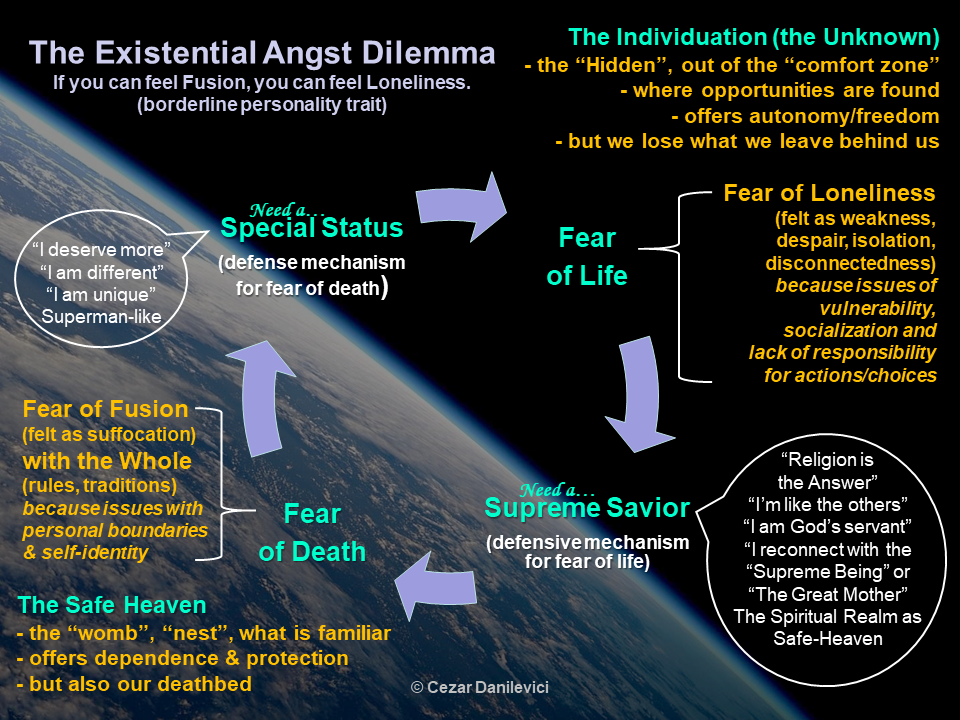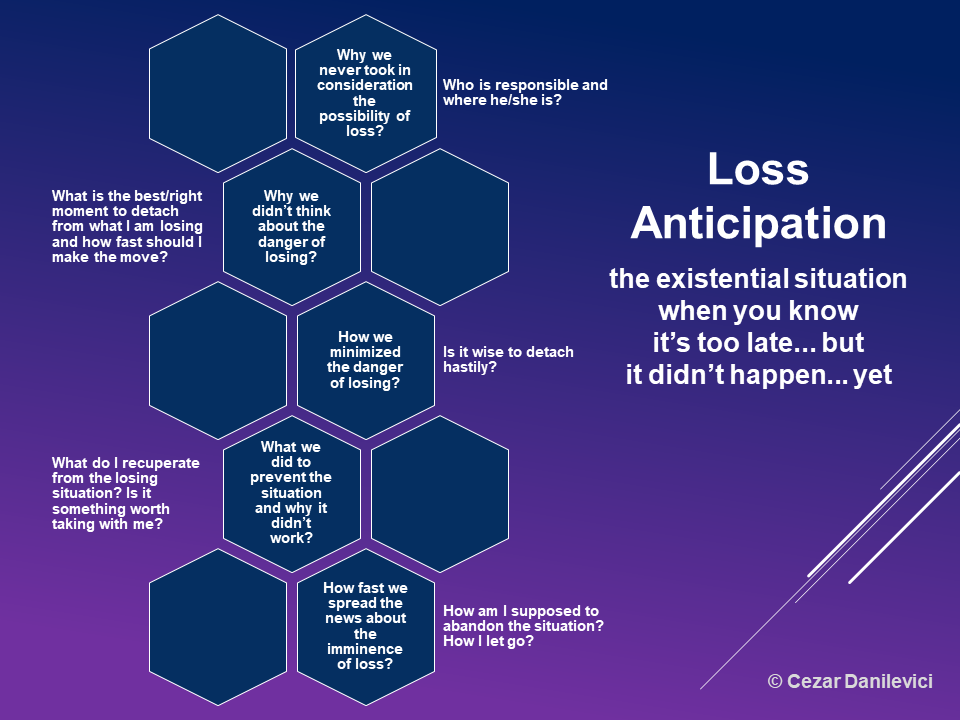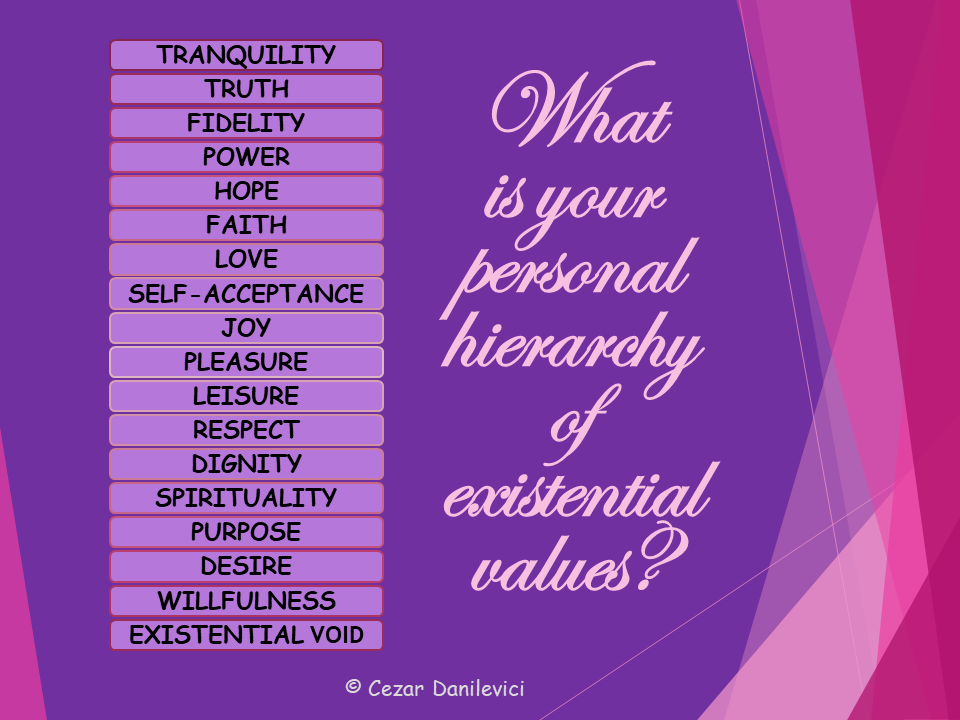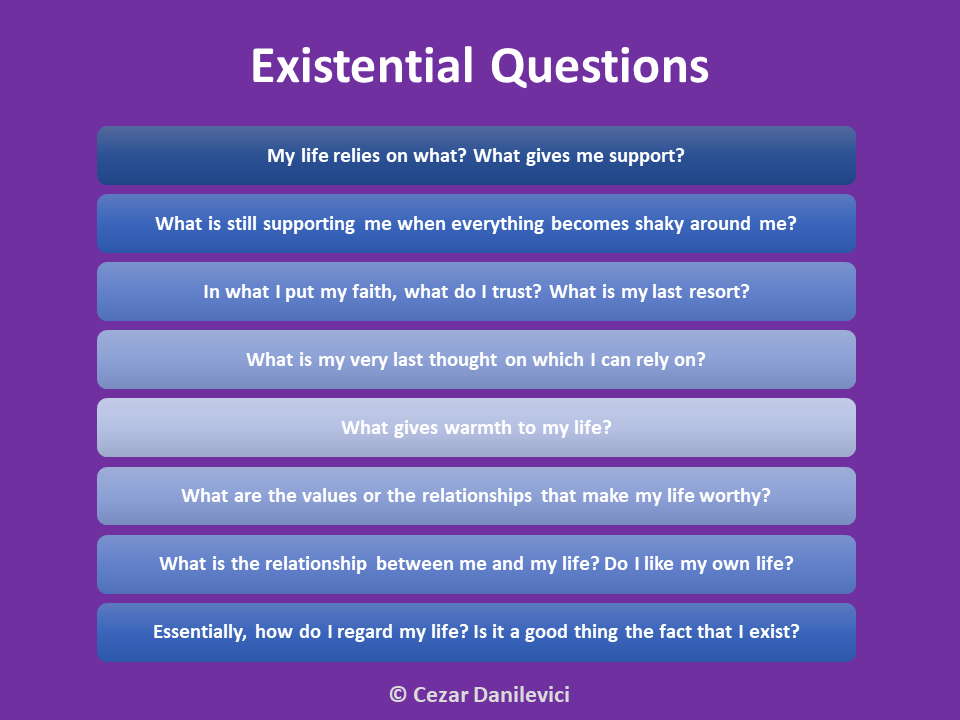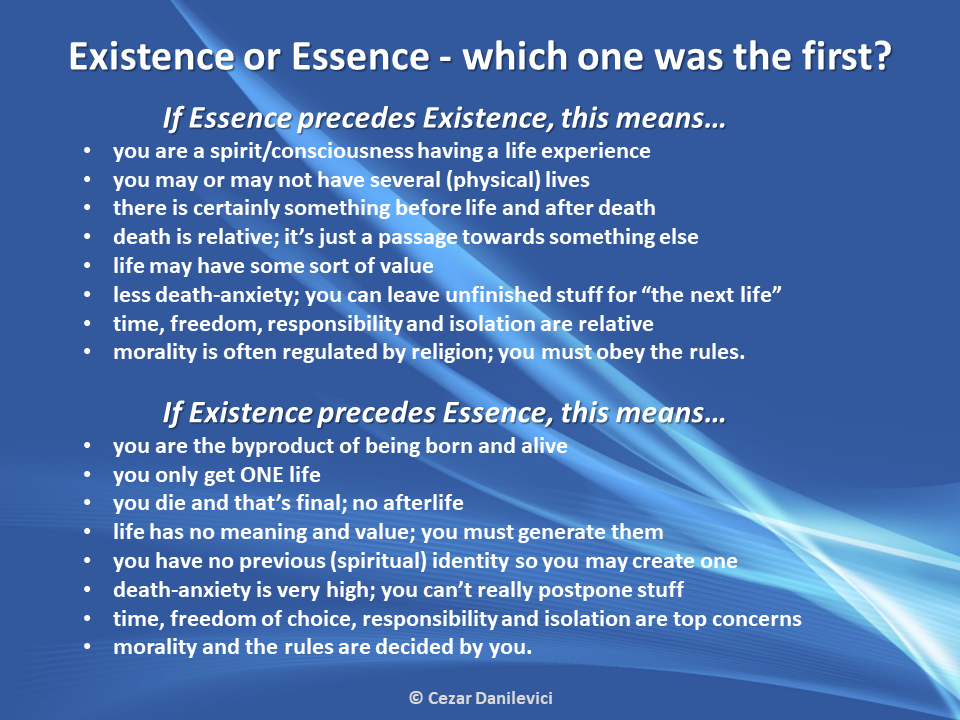Awakening begins when a man realizes that he is going nowhere and does not know where to go.
The existentialism can be compared to violently throwing a hammer or an axe directly into someone’s forehead. It is my preferred way of working with a patient. It also requires intelligent patients or clients, as the subjects discussed are mostly philosophical and involve concepts that are not accessible to the usual folk. My interview with a suicidal or borderline patient is mostly existentialist. The drug addicts and some of the intelligent neurotics do benefit of this technique, as well as those affected by depression and grief. The technique is non-directive, as it involves asking open questions and letting the patient ponder on them. I mix this existentialist flavor during an interview, especially when I use “psychotherapeutic questions”, that is, questions that trigger a lot of thinking and emotions while reframing reality. Below I will add some aspects linked to this technique, but I will keep for myself a lot of other aspects that contribute to the charm of this way of doing things and of… actually… living.
In the existentialist lifestyle there are only “yes” and “no” answers. There isn’t “maybe” and there isn’t “I don’t know”, which are largely accepted in psychodynamics. You MUST decide; it’s one way or another. Why? Because existentialism mostly deals with uncertainty, ambiguity, ambivalence, it is used especially when the client is confused. Choosing does not have to happen immediately, patients need time to reflect and think it through, but a “yes” or “no” answer is required so as to move on. Later, this yes/no answer is challenged. Actually, everything is open to challenge and debate, as the existentialism aims to thoroughly describe and make conscious one’s values, motivations, principles and choices, while making sure that “they are the real thing” and that “you are ready to die for them”.
In practice, when dealing with patients, the therapists need to ask themselves what the existential motivation of the patient is or what level of awareness and existence that particular patient has reached. Everything in existentialism is potentially offensive, so beware! Your sensibilities will definitely be triggered!
1. All people “are”. Period. They seem to say “I am”. They are alive on this Earth and in this existence. To this particular patient, one might address the following questions:
Why are you? Why do you exist? What do you do with this particular situation of existing in this life, of being alive? What are you looking for here, in this life? How is it for you the fact that you are here in this life without choosing, and there are things in life that do not (and did not) (and will not) depend on you? Since you are here, what are you doing with what you have? What are you doing with yourself? What is going to happen when you will cease to exist in this world? Where everything is going to go or disappear? Why are you alive now and not in the past or in the future? Why alive now? How is it for you that one day you will no longer be alive? What do you do with what you feel about death? What do you do with your limited existential time?
When people are (“I am”), people are anxious. Every human being is or has been at this existential level, so the anxiety is universal and it exists in each and every human being. For this reason, if someone is telling you that he/she is not afraid, or is not afraid of dying, he/she is lying to you. Anxiety is built-in in our existence, it’s embedded in the structure of life. Hence, it is unavoidable.
2. Some people “exist”. Note that I begin with “some”, as not all people exist, although all people are. To exist in this world involves “being born in the world”. Of course, philosophically speaking. This level involves value, the value of one’s existence. This involves desires, some of them satisfied, some of them not. To exist in the world means to give value to your existence and to be in a relationship with yourself as an external object of your own awareness. You must matter to yourself.
Some questions: What is your personal relationship with your own life? Do you feel your own value versus what you want or what you desire from this life? Are you in relationship not only with the world and the others, but also with your own desires? Is it good to be alive? Do you have a good or a bad life? Is it “warm and cozy” to be alive? Or you don’t give a f… about being or not being alive? Does it matter… well… everything? When is the last time you did something nice to/for yourself? Do you deserve something nice? Who says you deserve something nice?
Buddha says that the main reasons for suffering in this world is Desire, and the entire Buddhism aims to extinguish Desire so as to stop the pain and go back to Nirvana, which is a vague hazy world full of potentiality and lacking any individuality or individuation. For the existentialists, this involves canceling the very fact of existing of the individual, as an individual who lacks desires is an individual who lives only at the lower level of “I am”, just like any other animal. For this fundamental reason, the Buddhists are not so much existentialists… One must wish and desire so as to be in a relationship with oneself (with one’s desires). If at the level of “I am” the human being is in relationship with the world of others (there is a separation between me and what is not me), at the level of “I exist” there is a relationship with oneself (there is a relationship between me and my desires). What happens when one’s desires are not satisfied? Depression. Not having what you want means sadness and ultimately depression. Not all people can get depressed. For instance, those with more or less significant mental retardation do not get depressed; they only get frustrated because they are not born yet and they might never be. Most of the general population is also not born and is not depressed, preferring to stay at the anxiety/anger level and occasionally get hysterical or hypochondriac. From this perspective, being able to be depressed is a sign of intelligence (and perhaps wisdom), and I’m sure that this sounds deeply offensive…
Practical implications? Well… if you ask someone what he/she wants from life and you get a “poker face” back, you should ask yourself if that person is truly in a relationship with herself or not. If that person is at the first level of “I am”, where angst/anger reigns, and if there is no connection between her desires and herself, it is obvious why you can’t work at the second level of “I exist” and why the person can’t give you an answer. Then, when working with excessively religious persons, with fanatics, who – “God willing” – are doing what God tells them to do in the scriptures – no matter if they are Cristian, Jewish, Muslim, Buddhist or whatever – you can’t work at the second level because those persons are not yet, no longer or not at all in a relationship with their own desires, these desires being subjugated and submitted to “a greater force” or a religious god. However, if a religious person has a conflict between her own opinions (desires?) and what is prescribed by the religious consensus, at that moment the person is beginning to enter into contact with her own values and is beginning to separate herself from the mob (or the “universal chaos that was before our time” or “the archetypal womb”, so as to put it symbolically and metaphorically). At that moment you are at level 2 of “I exist” and a discussion can be initiated on whether that persons wants to separate (individualize) from the collective values of her faith (and pay the consequences, typically rejection or blaming), or if she wants to return to the common values and keep obeying to external rules (why paying also the price at an inner level, as this situation is like the one in Matrix when you take the other pill: you never get to wake up in your bed and pretend it never happened). So, in conclusion, knowing where your patient precisely is on the existential path is essential in shaping your discourse and avoid losing time working on something impossible because of your naïveté.
3. A minority of people not only “are” and “exist”, but they also “allow or permit to themselves to be the way they want to be”. It is one thing to have desires and be sad because the world is not adequate to your wishes, and a different thing to be who you really are and act this out in the exterior. That is, to free yourself, to liberate yourself from what you ought or ought not to be. These people can be described as “larger than life”. They are also described as psychopaths or having personality disorders. The archetype is the borderline personality disorder, but pretty much all personality disorders happen and are seen at this third existentialist level.
Some questions: Do you allow yourself to be authentic in the exterior, to be yourself? Do you feel connected to your own Soul? How do you represent or allow to live in the outer world not only your desires but your very own soul, your true essence? Can your “inner song” be heard by others? How is it for you to quietly die with your unheard song in you? How free you allow yourself to be in the exterior? Can you show your true face to the world without fearing judgement, shaming or gossip? Can you authentically be in the outer world without wearing a mask? What are the things you wished to be doing but you never did? Can you care enough to do them now? If not now, when?
Let’s take the example of a woman (can be a man also) who was taught to be faithful (to the partner, to God, whatever) by his family (through education). This person may have desires to cheat (hence being at level 2 of “I exist”, because she is in a relationship with her desires and she might get conflictual and depressed at some point). However, as long as the person remains blocked at the level of desires, she is at level 2. You know that the person is at level 3 of “I allow myself to be who I am” when you begin to sense during the psychotherapeutic dialogue that there is a distinct flavor of freedom and free will; the person might decide to cheat (hence acting out her “true self” or more specifically, what is true and authentic about herself at that particular moment) or not cheat (and assume there are infidelity drives in her soul but she decides not to act on them because she loves her partner or because of other value that is dear to her soul, such as, for example, not wanting to tarnish the idea of relationship she has vowed to be part of). In both cases, you can feel a distinct quality of freewill, acceptance, being assumed and a sense of inner strength. As I said, few people function at this level…
4. A distinctive “elite” reach the spiritual dimension of existence, the 4th level. They do not only “are”, “exist” and “are free to be who they really are”, but they are also “creating meaning”. This level is encountered typically in psychiatry when working with psychotics (schizophrenics), deeply mystical people and artists, who have an issue with the purpose of this existence, with the transcendental side of life. You need not only psychological knowledge, but also philosophical, theological and parapsychological knowledge so as to feel at ease at this level.
Some questions: What is your responsibility versus the meaning of your life? Do you decide the purpose of your life or you let life decide for you? How valid is the existential purpose or direction you take in life? Are you sure life has a meaning? Are you sure there is a definite direction? Can you fail at life’s purpose? How much is predetermined in life and how much can you choose? Are you really free in your choices? Can you choose not to choose in life? Given the fact that not choosing something is also choosing not to choose, can you really escape the burden of choice in this life? If your meaning in life is to raise children and those children leave the nest or die, what’s left for you at this level of meaning? Do you still have a purpose? How is it for you to have meanings that depend on other people or on exterior events?
The “meaning” level deals a lot with the inner/outer locus of control, with the absurdity of life, with the weight of responsibility, freedom and choice. When you “are free to exist as you desire”, there comes the question of “what for?” or “to what purpose?”. If level 1 is being an animal, level 2 is being a human being and level 3 is being a free and authentic human being, level 4 goes to the realm of the gods: the human being is challenged to create… to become a demiurge…
The existential motivations are the general framework of existentialism and a good indicator of how a therapist might conduct therapy without losing too much time. For me, it’s efficiency. I’d say that the huge majority of the population is at level 1 and level 2, and most psychotherapy techniques are efficient at these 2 levels. However, when dealing with level 3 (especially the increasingly frequent borderline patient who comes after a suicide attempt in emergency at 3 o’clock in the night) and level 4 (the psychedelic schizophrenic or drug addict who speaks directly about the lack of meaning, the relativity of reality and several universes existing as potentials at the same time, a time which is also an illusion by the way), you need to have the guts and the knowledge to manage a decent discussion without being seen as dumb. For these last 2 levels, you need to achieve some proficiency in existentialism.
—
Existentialism Infographics:
